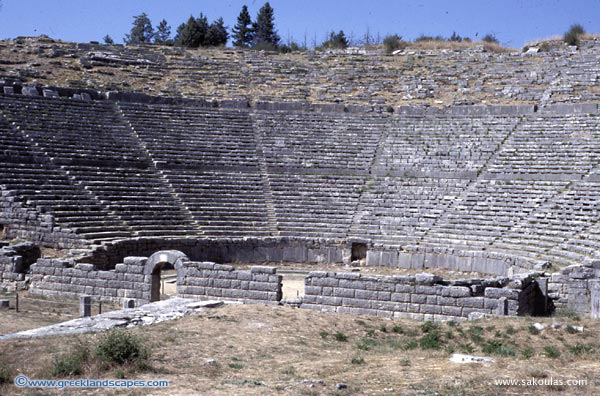This schedule is subject to change. Links marked
with a red diamond are required additional background reading,
due at the same time as the readings of the primary texts.
|
Week 1 — Monday/Tuesday 8-13/8-14 — Chat 8–9:15 pm
Sumer
|
||
|
Assigned reading
Who wrote it?
Author(s) unknown.
When was it written?
Before 2000 BCE.
In what language was it written?
Sumerian, which is unrelated to any
other known language.

Glyphs for "ušumgal" (great dragon/snake).
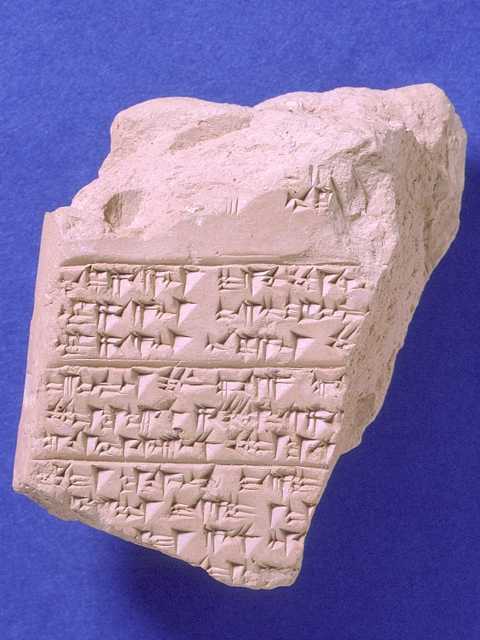
A cuneiform tablet
(bigger).
Where was it written?
In Sumer. The region
as a whole is traditionally called Mesopotamia, "between the
rivers," referring to the plain of the Tigris and Euphrates
Rivers, also called the Fertile Crescent. Today we call it Iraq.
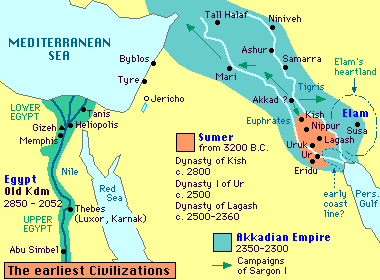
Ancient Mesopotamia (bigger).
|
Discussion/Homework
This Sumerian material is some of the oldest written material known, from about 4500 years ago — much older than the Bible. Very little is known about the Sumerians apart from these written documents, so it is often hard to make sense of what is going on in their poetry. Sumer ultimately disappeared as a nation and its language had no successor. However, Sumerian religion and art were very influential on neighboring peoples — elements of it show up in both Babylonian and Hebrew literature. But the Sumerian world is very odd nonetheless. Forum assignment: Pick out something that strikes you as peculiar, and try to analyze why it seems peculiar to you. How does it violate your expectations? How does it surprise you? What does this oddness reveal (or at least suggest) about the Sumerians and their world view? Post your answers as replies to this post so that they all stay in one thread. |
Extras
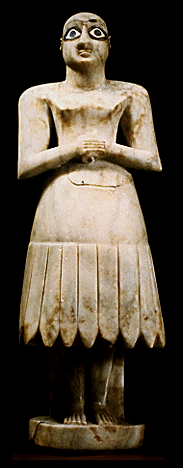
Figurine of a Sumerian gentleman. Wait a minute — is that a
Utilikilt he's wearing?
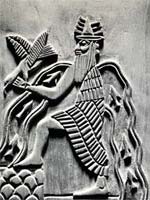
Enki. Note the water flowing out of him and the fish jumping back up.
|
|
Week 2 — Monday/Tuesday 8-20/8-21 — Chat 8–9:15 pm
Babylon
|
||
|
Assigned reading
Who wrote it?
Author(s) unknown.
When was it written?
Circa 2000 BCE.
In what language was it written?
Babylonian, a Semitic
language (hence related to Hebrew). It was rendered in cuneiform
characters on clay tablets.
Where was it written?
In Babylon, based on earlier, pre-Semitic Sumerian sources.
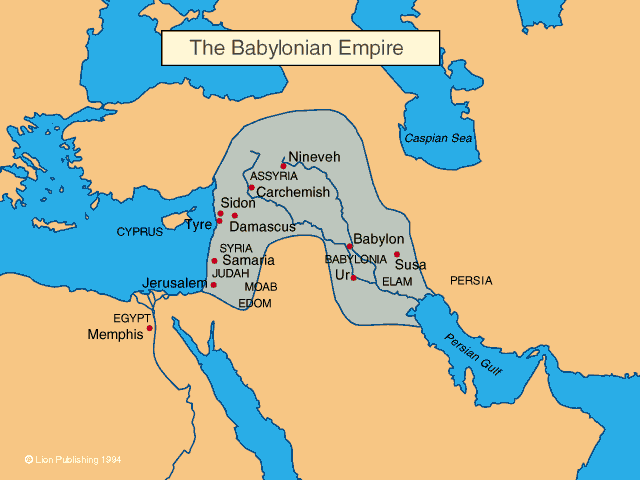
Map of the Babylonian Empire in the seventh century BCE
(bigger).
|
Discussion/Homework
Forum assignment: Several episodes in Gilgamesh resemble stories familiar to you from the book of Genesis in the Hebrew Bible. How can we account for these similarities? What are the most reasonable explanations? Also, select one of these parallel narratives and discuss what you think the point of the story is in Gilgamesh |
Extras

The restored Ziggurat of Ur (in Iraq), originally a temple structure
(bigger).

King Hammurabi delivers his law to the people of Babylon
(bigger)
on this stele housed at the Louvre in Paris. The Code of Hammurabi resembles the Mosaic Law
in many ways and preceded it.
Babylonian
mythology FAQ [dead link]
Iraqi
treasures pilfered through US neglect. The (now fired) Secretary of Defense, Donald
Rumsfeld, commented at the time: "Stuff happens."
So much for a 5000-year-old cultural heritage.
|
|
Week 3 — Monday/Tuesday 8-27/8-28 — Chat 8–9:15 pm
Hebrew Bible
|
||
|
Assigned reading
Selections from the Hebrew Bible, called in Hebrew the תנ״ך Tanakh.
Genesis
chapters 1-3, 6-9, 11:1-9, 12:1-9, 17, 37-50.
Exodus
chapters 19:1-6, 20:1-17.
Job
chapters of Job 1-13, 16, 19, 38-42.
Read all of Jonah. Who wrote it?
Authors unknown. Scholarly consensus holds that early, originally
oral sources (some of them Babylonian) were compiled and edited
by priests during the Babylonian
Captivity and the Second Temple
period that followed the Jews' return from exile. The wide variety of voices
and styles that persist even within single books (notably Genesis)
remain as traces of the many hands that went into the composition of
Jewish scripture.
The first five books of the Hebrew Bible (Genesis, Exodus, Leviticus, Numbers,
and Deuteronomy) are known as the Torah (Hebrew תורה Law or Instruction)
See this diagram
for a sense of how the Torah was composed according to the Documentary Hypothesis.
Here is another diagram
of the Documentary Hypothesis with a description of each of the voices.
When was it written?
The Hebrew Bible took its final form in the fifth century BCE.
In what language was it written?
Hebrew. See the
original text.
(Courtesy of www.fourmilab.ch.)
Listen
to an MP3 with several excerpts from Genesis read in Hebrew. (Courtesy of
www.greeklatinaudio.com.)
Where was it written?
Probably in Babylon and Jerusalem.
|
Discussion/Homework
There is a lot of important background material for you to look at. Make sure you understand what the "Documentary Hypothesis" is before you log into the chat. Note about the Hebrew Bible in general: We approach these texts in the context of the history of civilization, the history of literature, and the techniques of rhetoric and storytelling. In other words, this is a literature class, not a Sunday morning homily. The "historical truth" of these texts is not of interest to us, because we are studying how they work as literature, not as journalism. And remember: These were originally Hebrew texts written by and for Hebrews. Don't make the mistake of reading them as Christian texts; always try to imagine how the original audience would have understood and used them. Forum assignment: There is too much and too varied material this week to deal with adequately in one hour of chatting, so I will use the forum to extend what we can do. Please respond to the following in your forum post: 1. What is the relationship between God and Man in these texts? Quote a passage or summarize a story, and say what it reveals about that relationship. 2. Find a passage from a different text that LEAST agrees with what you claimed in #1 above. 3. Find an example of irony or sarcasm in one of these texts, quote it, and explain why you consider it ironic. |
Extras
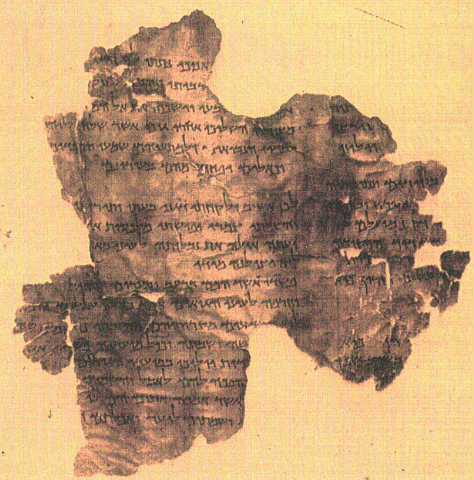
This first century CE parchment
fragment is from a commentary, or "pesher," on the
prophetic biblical verses from the book of Hosea (2:8-14)
(bigger).
|
|
Week 4 — Monday/Tuesday 9-10/9-11 — Chat 8–9:15 pm
Classical Greece: Homer
|
||
|
Assigned reading
Iliad:
Book 1:1-272 (argument between Achilles and Agamemnon)
Book 5 (battle, death, death, battle)
Book 22 (the death of Hector)
Books 1 through 12 (Telemachus searches for his father; Odysseus sets out
for home; Odysseus tells the Phaeacians of his travels)
Books 20 through 23 (Odysseus takes his revenge on the suitors; reunion
of Odysseus and Penelope) Who wrote it?
Homer (Greek Όμηρος Hómēros) may or
may not have been a real person. Regardless, the epic
poems are clearly the product of oral composition and must have
been enhanced and refined by many generations of bards.
When was it written?
The eighth or seventh century BCE, based on linguistic and other data.
Composed orally, transcribed at a later date.
In what language was it written?
Classical Greek.
Listen
to readings in Greek from Homer and other poets, along with
commentary and translations, by Thomas McEvilley. (Courtesy of
University of Pennsylvania.)
Where was it written?
According to
tradition, Homer was from Chios in Ionia, a region of Greek
coastal and island settlements in Asia Minor (modern-day Turkey).
The dialect of the epics is Ionian.
Here is a map of Ancient
Greece with Chios and Troy visible at right.
|
Discussion/Homework
Forum assignment: What sort of epic hero is Achilles? What sort of epic hero is Odysseus? What are his credentials? What sets him apart from other epic heroes? Is there any interesting point of comparison to be noted with Gilgamesh? Give examples to back up what you say. |
Extras
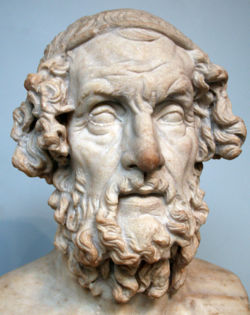
Ancient but entirely fanciful bust of Homer
(bigger).

Detail from a Greek vase: Odysseus stabs Polyphemus's eye
(bigger).
|
|
Week 5 — Monday/Tuesday 9-17/9-18 — Chat 8–9:15 pm
Classical Greece: Euripedes
|
||
|
Assigned reading
Who wrote it?
Euripides (Greek Ευριπίδες)
When was it written?
431 BCE, winning the third place prize in that year's
Dionysia
festival — a lackluster showing.
B. 480 BCE – D. 406 BCE.
In what language was it written?
Classical Greek.
Where was it written?
Athens, Greece.
|
Discussion/Homework
Forum assignment: Aristotle said (read the notes linked at right) that a tragedy must involve a main character of higher-than-average nobility and virtue, who undergoes a fall from good to bad fortune as a consequence of his/her own well-intended actions. Is there a protagonist in Medea that fits this description? Back up your answer with evidence from the text. |
Extras

Fiona Shaw as Medea on Broadway
(bigger). Scary!
|
|
Week 6 — Monday/Tuesday 9-24/9-25 — Chat 8–9:15 pm
Classical Greece: Plato & Thucydides
|
||
|
Assigned reading (1)
Who wrote it?
Plato (Greek Πλάτων Plátōn, "wide,
broad-shouldered"). Real name Aristocles.
B. 427 BCE – D. 347 BCE
Plato was from Athens.
When was it written?
The Apology is thought to be one of Plato's earliest dialogues.
In what language was it written?
Classical Greek.
Where was it written?
Athens. See map of Ancient
Greece.
Assigned reading (2)
Who wrote it?
Thucydides (Greek Θουκυδίδες
Thoukudídēs). Historian.
B. circa 460 BCE – D. circa 400 BCE.
Possibly from Thrace, in northern Greece.
When was it written?
Circa 411 BCE.
In what language was it written?
Classical Greek.
Where was it written?
Athens, Greece.
|
Discussion/Homework
Forum assignment: Homer and Euripides were writers of fictional tales, while Plato and Thucydides are in large degree writing non-fictional material. Identify thematic continuities between this week's readings and the earlier Greek readings by Homer and Euripides. Quote and discuss a pair of passages that proves your point. Also familiarize yourself with the diagram of Plato's Metaphor of the Line. This diagram illustrates how Plato divided the world of Being from the world of Becoming — a basic concern in Greek philosophy. "Being" includes all eternally unchanging truths and realities, while "Becoming" includes the ever-changing physical world, the world of time, and all illusions and representations within it. Plato always privileges Being over Becoming. How does this relate to Socrates' predicament as he stands trial in Athens? Bear in mind that Plato is the writer of this dialogue, and that he is also present (as a young man and thus a character in his own dialogue) in the assembly that is trying Socrates. Socrates was Plato's teacher; the injustice described in the Apology sets Plato on a course of philosophical and political thinking that consumes the rest of his life. Plato's greatest student was Aristotle, and Aristotle's most famous student was Alexander the Great. Small world! Thucydides, meanwhile, is writing about the war between Athens and its allies on one side, and Sparta and its allies on the other. The war is over trade and spheres of influence — the usual. Thucydides is an Athenian. Athens had a far more advanced culture than Sparta, one that profoundly shaped later Western civilization and even Muslim civilization. Sparta won the war, however. |
Extras

Ancient but probably fanciful bust of Socrates
(bigger).
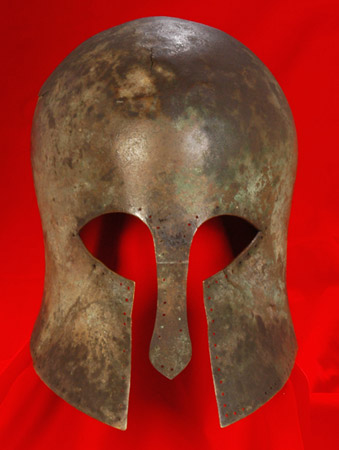
2700-year-old Greek bronze helmet
(bigger).
|
| Exam #1 opens at noon Thursday 9-27 and closes at 6 pm Friday 9-28. The exam will cover Sumer through Euripides. | ||
|
Week 7 — Monday/Tuesday 10-1/10-2 — Chat 8–9:15 pm
Classical India
|
||
|
Assigned reading
Mahābhārata
(Books I and IV) and Bhagavad Gītā
(all) Who wrote it?
The Mahābhārata is ascribed internally to Maha Rishi Veda Vyasa, a character in the epic.
When was it written?
The Mahābhārata is thought to have been composed, assembled, and edited by many hands
between 500 and 50 BCE. The Bhagavad Gītā is believed to be a fairly late addition.
In what language was it written?
Sanskrit, an Indo-European language closely related to English and other European languages.
The title Mahābhārata (Sanskrit: महाभारत)
can mean either "Great India" or the "Great Story of the Bhārata Dynasty."
The title Bhagavad Gītā (Sanskrit: भगवद् गीता)
means "The Song of the Divine One" and is regarded by sacred scripture by most Hindus.
Chanting
of Chapter One of the Bhagavad-Gita. (Courtesy of
www.vaisnava.cz. Click to see links
to recordings of the entire work.)
Where was it written?
In India.
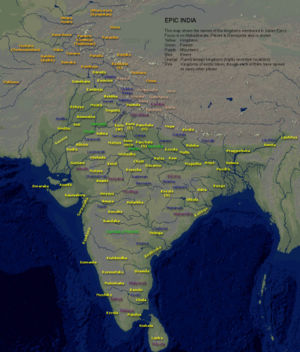
India in the epic period of the Mahābhārata and Rāmāyaṇa
(bigger).
|
Discussion/Homework
The Mahabharata is the longest epic ever written, maybe ten times the length of the Odyssey, so I don't require that you read the whole thing. The rendering of the Sanskrit names into English varies from one translation to another, so don't be alarmed if you see Bhishma in one text and Bheeshma in another; they are the same person. The Mahabharata ("The Epic of the Bharatas") is the story of the rival branches of the Bharata clan: the Kauravas and the Pandavas. They eventually have a war to settle their differences (which provides the setting of the Bhavagad-Gita.) The family relations are quite complicated, not least because some of these people are engendered in miraculous ways, such as Dhriterashtra's 100 sons. Reading Indian literature means quickly assimilating a great deal of Indian philosophy and religion. The core concepts of Hindu philosophy are to be found in the terms Atman, Brahman, Dharma, Karma, and Samsara. These terms are listed in the right-hand column. You won't do well in this class unless you know what these terms mean, and they will come up again when we talk later about Buddhism while reading the Japanese Noh play Atsumori. Forum assignment: The ideas of fate and duty play a special role in Indian thinking. Discuss a couple of examples from the readings and compare them to Gilgamesh, or the Greeks, or the Judaeo-Christian tradition. What is different, what is comparable? |
Extras
Terms from Hinduism to know:

Krishna, from a Rajasthani painting
(bigger).

Krishna and Arjuna ride to war
(bigger).
|
|
Week 8 — Monday/Tuesday 10-8/10-9 — Chat 8–9:15 pm
Rome: Virgil
|
||
|
Assigned reading
Book 1 (Introduction)
Book 2 (The Fall of Troy)
Book 4 (Dido & Aeneus)
Book 6 (The Underworld, especially lines 596-640) Who wrote it?
Publius Virgilius Maro
B. 15 October 70 BCE – D. 21 September 19 BCE
From near Mantua in Cisalpine Gaul (northern Italy).
When was it written?
29–19 BCE
In what language was it written?
Latin. Here is the
opening of the Aeneid in the original:
Arma virumque cano, Troiae qui primus ab oris
Italiam, fato profugus, Laviniaque venit litora, multum ille et terris iactatus et alto vi superum saevae memorem Iunonis ob iram; multa quoque et bello passus, dum conderet urbem, inferretque deos Latio, genus unde Latinum, Albanique patres, atque altae moenia Romae. Wait, there's more! Listen
to lines 1-49 read in the restored pronunciation of classical
Latin by Robert P. Sonkowsky, University of Minnesota. (Courtesy
of University of Minnesota.)
Where was it written?
In Rome, the seat of empire.
To locate both Virgil's Italy and
the settings of the Aeneid, consult the Map
of Ancient Italy and Carthage (courtesy of the Ancient
World Mapping Center at the University of North Carolina).
|
Discussion/Homework
Forum assignment: Compare the selections from the Aeneid to the other epics we've seen, namely, the Odyssey and Gilgamesh. What is similar, what is different about Virgil's work? Cite some specific passages in Virgil to support what you are claiming. I think Virgil is up to something a bit different from his predecessors. Do you see it? Another question, for the adventurous: Why does Virgil make Dido, a foreign queen, such a central figure in a poem about the founding of Rome? |
Extras

Publius Virgilius Maro (Virgil)
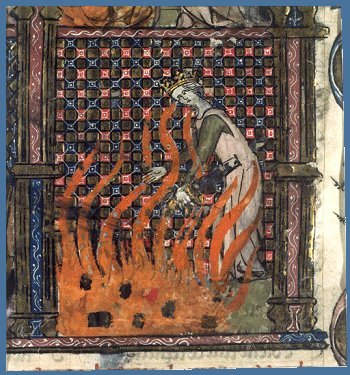
Dido on her pyre in a medieval tapestry
(bigger).
|
|
Week 9 — Monday/Tuesday 10-15/10-16 — Chat 8–9:15 pm
New Testament
|
||
|
Assigned reading
Who wrote it?
Author(s) unknown. Traditionally the apostle Matthew, though contemporary scholarship
favors a more complex composition history closely connected to the Gospels of Mark and Luke
and to a lost source ("Q") common to all of them.
When was it written?
Late first century CE.
In what language was it written?
Koine (post-Classical) Greek.
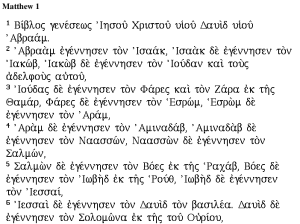
The opening of the Gospel of Matthew in Greek
(bigger).
Courtesy of the University of York.
Listen to these recordings in Aramaic of the Good Friday Entombment Service of
Jesus Christ: Glory
(majdlak.mp3) and Bearers
of Fragrance (hamilatilteeb.mp3). These were recorded in Maalula, Syria, where Aramaic is still
spoken today. (Courtesy of http://phoenicia.org/
and the Melkite Greek Catholic Patriachal Office of the Cathechism.) Aramaic is the language which
Jesus actually spoke. Mel Gibson's movie
The Passion of the Christ
correctly portrays the common people of Jesus's time speaking Aramaic, but he proves he is not
just a drunk and an anti-Semite, but also a ignoramus, by having religious and government officials
speak Latin. In fact, they
spoke Greek, the language the New Testament was written in. Greek had been for centuries the
lingua franca
of the eastern Mediterranean region.
Where was it written?
Unknown.
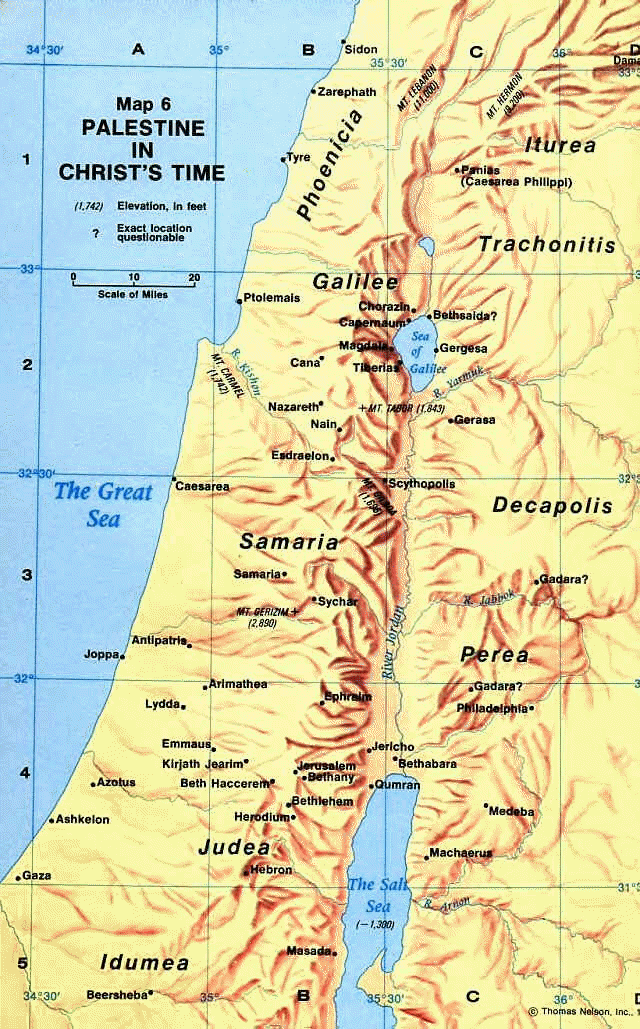
Map of Palestine at the time of Jesus
(bigger).
|
Discussion/Homework
A small reminder: This is a literature class. Our approach to the Gospel of Matthew will be textual, historical, rhetorical, thematic, etc. — all that English literature stuff. I don't have much interest in what your minister, priest, rabbi, guru, or shaman may think about this book, so please don't quote them to me. Quote from the text instead, while being aware that this text does have one important context: the Hebrew Bible. Imagine yourself in the place of the gospel's original audience, and think about how it would have struck those people. Furthermore, I don't plan to discuss the primarily narrative aspects of this gospel, the stories of Jesus's birth, crucifixion, resurrection, and so on. These narratives are of great interest to Christian believers, obviously, but they are of less interest in a thematic analysis of the gospel. Instead, I will focus on two matters: the re-interpretation to which Jesus subjects Jewish law (especially in the Sermon on the Mount) and the general function of storytelling (parables) in Jesus's teaching. Forum assignment: Pick a parable from the many that are contained in this gospel, and explain what it is talking about, based on internal evidence within this text. Give specific examples, as always. Back up what you say with evidence from the text, as always. |
Extras
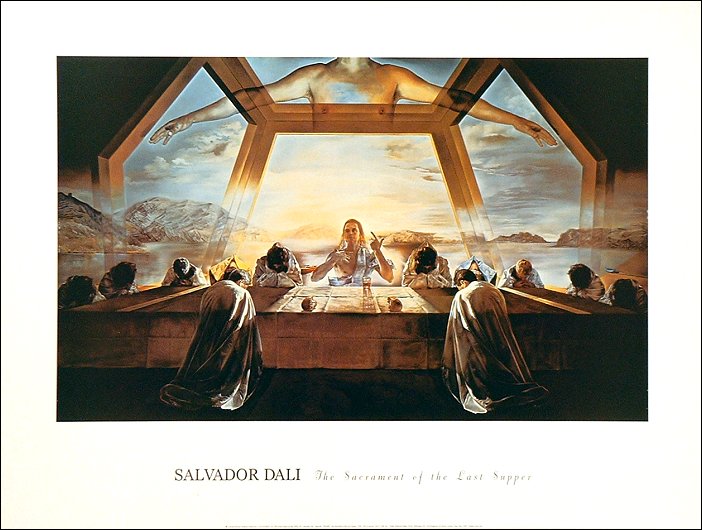
Salvador Dali's "Last Supper
(bigger).
|
|
Week — Monday/Tuesday / — Chat 8–9:15 pm
Islam: 1001 Nights
|
||
|
Assigned reading
The Arabian Nights (properly The Book of One Thousand and One Nights)
Who wrote it?
The stories were originally Indian and Persian folktales. According to legend they were
translated into Arabic and compiled by Abu abd-Allah Muhammed el-Gahshigar in the ninth century CE.
When was it written?
The original folktales date from antiquity, the expanded collection was compiled late in the first millenium CE,
and the frame tale was added in the 14th century CE, concluding the composition process.
In what language was it written?
In Persian, later translated into Arabic, where more stories were added.
Persian title: هزار و یک شب
Hazār-o Yak Šab
Arabic title: كتاب ألف ليلة و ليلة
'Alf Layla wa-Layla
Where was it written?
Persia, Arabia.
|
Discussion/Homework
Forum assignment: The frame tale was added quite late in the textual history of the Nights. How does its presence alter the meaning of the stories that make up the collection? What are the possible reasons for constructing a nested narrative like this — stories within stories, endlessly? Another question: Do these stories (either individually or as a whole) offer up a moral or lesson? |
Extras

Arabic calligraphy
(bigger).
|
| Exam #2 opens at noon Thursday 10-18 and closes at 6 pm Friday 10-19. The exam will cover Plato through Matthew. | ||
|
Week 10 — Monday/Tuesday 10-22/10-23 — Chat 8–9:15 pm
Medieval Japan
|
||
|
Assigned reading
Who wrote it?
Zeami Motokiyo (Japanese [kanji] 世阿弥 元清).
B. 1364 CE – D. 1443 CE.
With his father, Zeami Motokiyo founded the Noh theater.
When was it written?
14th/15th century CE Japan.
In what language was it written?
Japanese.
Where was it written?
Japan.
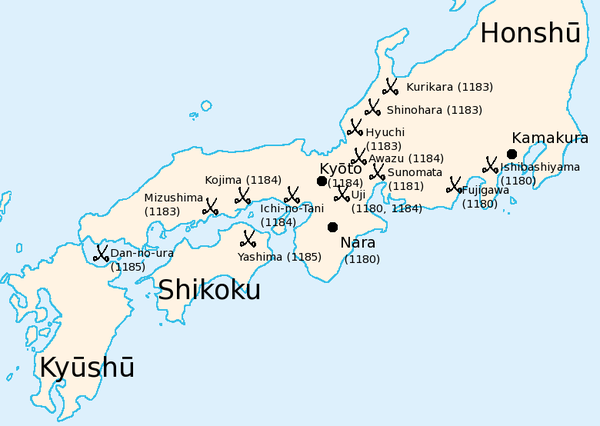
Battles of the Genpei War,
including Ichi-no-tani, where Atsumori and Kumagai fought
(bigger).
|
Discussion/Homework
Forum assignment: What kind of play are we dealing with here? Is this a tragedy? Why or why not? (I assume you remember that tragedy is a specifically Greek form of drama, as exemplified in Medea, and that it is not simply something "sad.") Make sure you familiarize yourself with the essential tenets of Buddhism: the Four Noble Truths and the Noble Eightfold Path. I also provide some additional Atsumori links you may find interesting. |
Extras

Meditating Buddha
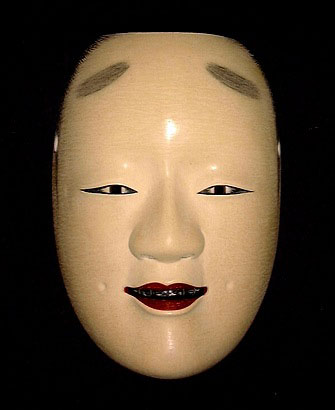
An Atsumori mask worn by a Noh player. Check out those stylish black teeth
(bigger).
Wikipedia on the Genpei War
between the Taira (Heike) and Minamoto (Genji) clans for control of medieval Japan.
|
|
Week 11 — Monday/Tuesday 10-29/10-30 — Chat 8–9:15 pm
Medieval Europe: Dante
|
||
|
Assigned reading
Divine Comedy: The Inferno — PAPER EDITION Who wrote it?
Dante Alighieri
B. circa 1 June 1265 – D. 13/14 September 1321.
A native of Florence, Italy.
When was it written?
Circa 1300–1321 CE.
In what language was it written?
Tuscan Italian, establishing that dialect as the Italian
literary standard.
Here is the pasage from Canto V where Francesca begins
speaking to Dante. You can
listen here
to the same passage being read aloud. (Courtesy of
www.logoslibrary.eu.)
5. 82 Quali colombe dal disio chiamate 5. 83 con l'ali alzate e ferme al dolce nido 5. 84 vegnon per l'aere, dal voler portate; 5. 85 cotali uscir de la schiera ov'è Dido, 5. 86 a noi venendo per l'aere maligno, 5. 87 sì forte fu l'affettuoso grido. 5. 88 ŤO animal grazioso e benigno 5. 89 che visitando vai per l'aere perso 5. 90 noi che tignemmo il mondo di sanguigno, 5. 91 se fosse amico il re de l'universo, 5. 92 noi pregheremmo lui de la tua pace, 5. 93 poi c'hai pietà del nostro mal perverso. 5. 94 Di quel che udire e che parlar vi piace, 5. 95 noi udiremo e parleremo a voi, 5. 96 mentre che 'l vento, come fa, ci tace. 5. 97 Siede la terra dove nata fui 5. 98 su la marina dove 'l Po discende 5. 99 per aver pace co' seguaci sui. 5.100 Amor, ch'al cor gentil ratto s'apprende 5.101 prese costui de la bella persona 5.102 che mi fu tolta; e 'l modo ancor m'offende. 5.103 Amor, ch'a nullo amato amar perdona, 5.104 mi prese del costui piacer sì forte, 5.105 che, come vedi, ancor non m'abbandona. 5.106 Amor condusse noi ad una morte: 5.107 Caina attende chi a vita ci.... Where was it written?
In exile from Florence, in various places in Italy and possibly France.
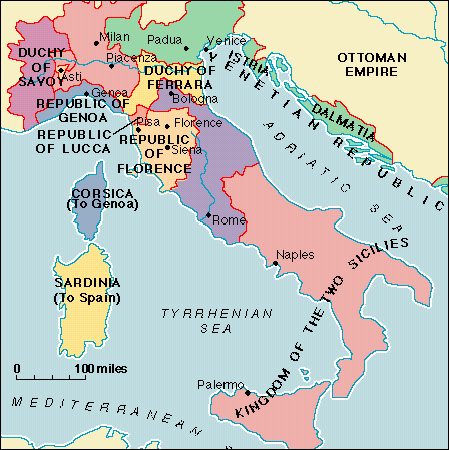
The States of Italy during the Renaissance, c. 1494
(bigger). (Courtesy of
WW Norton Co.)
|
Discussion/Homework
You need to read the entire Inferno for this week. Forum assignment: Select one of the episodes in the Inferno and explain how the punishment fits the crime. Be detailed, and see if you can find any additional information about the characters involved. Between the WWW, encyclopedias, and (conveniently) the notes in the back of the book, you shouldn't have trouble finding information. Avoid talking about Paolo & Francesca, Ugolino, or Ulysses, since those are mentioned in the quiz. |
Extras

Dante
(bigger).
|
|
Week 12 — Monday/Tuesday 11-5/11-6 — Chat 8–9:15 pm
Medieval Europe: Chaucer
|
||
|
Assigned reading
Who wrote it?
Geoffrey Chaucer
B. circa 1343 CE – D. 25 0ctober 1400 CE.
Native of London, England.
When was it written?
1380s–1390s CE.
In what language was it written?
Middle English.
Where was it written?
London, England.
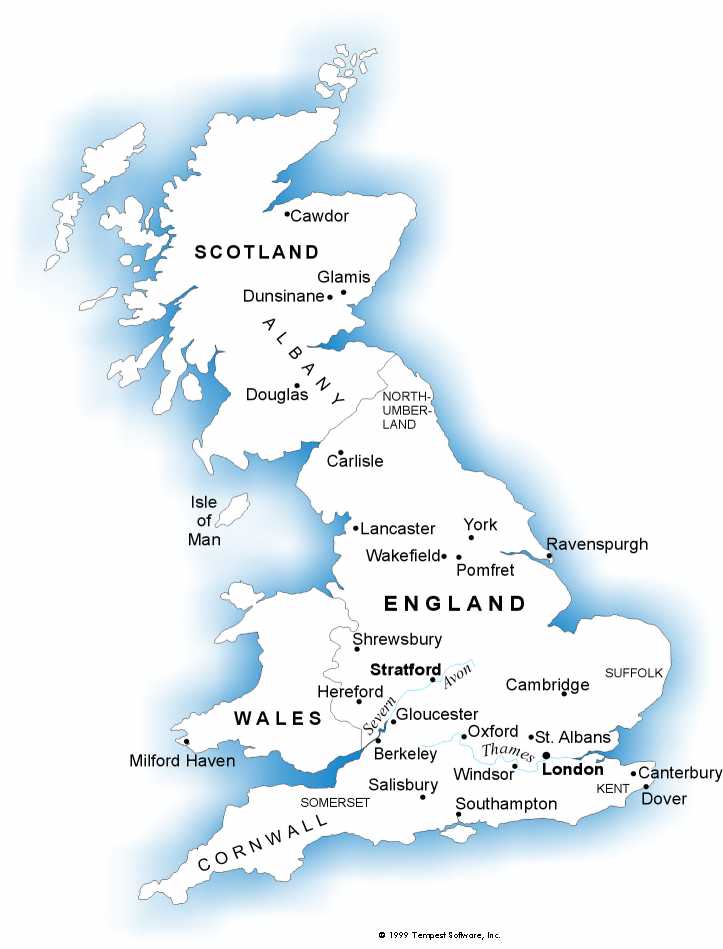
A map of England showing London, Canterbury, and Stratford
(bigger).
|
Discussion/Homework
We are confronting untranslated material for the first time this week: Middle English from 600 years ago. It's hard but not impossible to read it. Some of the vocabulary is like that of today's English, but there are also many words that are unfamiliar. For some of these words it may take a bit of hunting to find definitions. Forum assignment: Make up a brief glossary of Chaucerian English words, providing a modern English translation of the words and TWO examples (using complete sentences). Explain what the sentences mean — give a paraphrase. Do THREE WORDS, for SIX SENTENCES + PARAPHRASES. Picking of words will be first come, first served: don't use any words that somebody else has already used. Note: I mean here that you need to find sentences by Chaucer, not that you make them up. |
Extras

Chaucer
(bigger).
|
|
Week 13 — Monday/Tuesday 11-12/11-13 — Chat 8–9:15 pm
Modern Europe: Montaigne
|
||
|
Who wrote it?
Michel Eyquem de Montaigne
B. 28 February 1533 CE – D. 13 September 1592 CE
Born in Périgord, France.
When was it written?
1580 CE.
In what language was it written?
French.
Where was it written?
In Périgord, France.
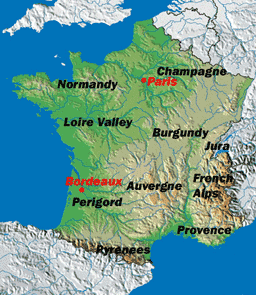
Map of France showing Périgord in Bordeaux.
Montaigne lived out in the sticks.
|
Discussion/Homework
Forum assignment: How can Montaigne be contrasted with Chaucer and Dante? What is different about his world view? Give an example of Montaigne's way of thinking about the world and compare it to an example from one or both of those other two authors. Note: First come, first served. Do not repeat examples that other people have already given. I will delete repetitious posts. Be sure to provide actual textual examples, not generalizations or summaries!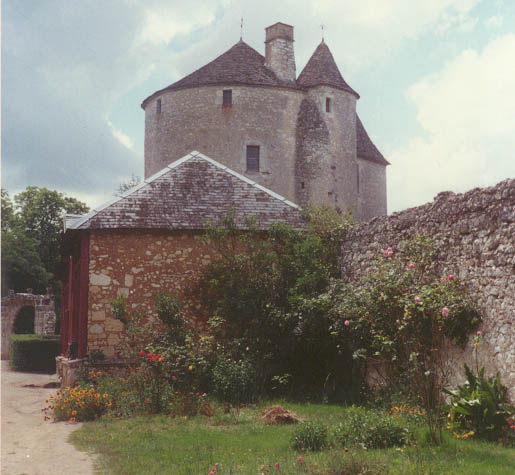
Montaigne's tower, where he wrote.
|
Extras

Michel de Montaigne, drawn from life in 1590.
(bigger).
|
|
Week 14 — Monday/Tuesday 11-19/11-20 — Chat 8–9:15 pm
Modern Europe: Shakespeare
|
||
|
Assigned reading
King Lear -- PAPER EDITION Who wrote it?
Despite silly theories tossed out over the centuries,
it really was written by William Shakespeare.
B. 23 April 1564 CE – D. 23 April 1616 CE
Native of Stratford-upon-Avon in Warwickshire, England.
When was it written?
First appeared in quarto form in 1608.
In what language was it written?
Early Modern English.
Where was it written?
London, England. See the
England map.
|
Discussion/Homework
First, there are going to be TWO Lear discussions. It's a big play, and there is a lot to talk about, so there will be a final chat next week. Forum assignment: I want you to consider Lear in context. What are the medieval elements in this play (think Dante, Chaucer) and what are the modern elements (think Montaigne)? Try to find an example of each and explain why it's an example. |
Extras

Shakespeare
(bigger).
Shakespeare quoted extensively from his (probable) friend John Florio's translation of
Montaigne's Essays (1603), in Lear particularly from An
Apologie of Raymond Sebond.
|
|
Week 15 — Monday/Tuesday 11-26/11-27 — Chat 8–9:15 pm
Modern Europe: Shakespeare (cont.)
|
||
|
Assigned reading
King Lear continued. |
Discussion/Homework
Shakespeare does things in this play that have long puzzled and alarmed people. The ending was so disliked that it become common in the 18th century to perform a modified version in which Cordelia survives. The role of the Fool is also rather extraordinary. Forum assignment: Respond to one of the following: 1. What does it mean to make the Fool one of the wisest characters in the play? 2. What does it mean that Cordelia dies at the end? The decision to kill her off is not required by any obvious logic of the plot, is it? |
|
| Exam #3 opens at 5 pm Friday 11-30 and closes at 10 pm Tuesday 12-4. The exam will cover Motokiyo through Shakespeare. | ||
